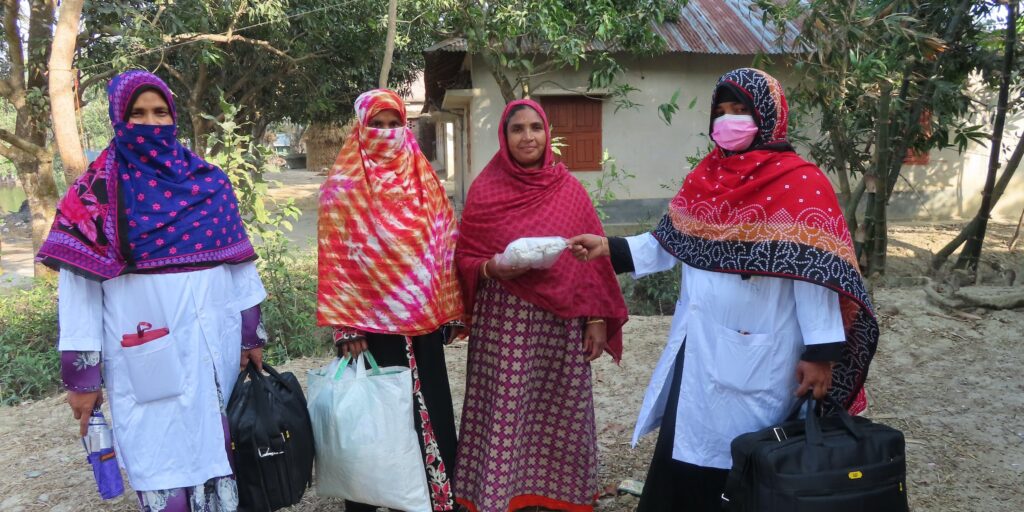Around the globe, extreme poverty holds mothers and girls back in so many ways.
For instance, in countries like Bangladesh, adolescent girls are often forced into arranged marriages to alleviate the “burden” they have on financially strapped parents.
As a result, these girls have to stop playing with their friends, attending school – and stop being kids. Their educational dreams vanish as new adult responsibilities are thrust upon them.
This is was what happened to Moriam.
One of six siblings in her childhood home, one day Moriam was shocked when her father announced that she would be married to a man she’d never met. Her family’s finances were simply stretched too thin not to take advantage of the “relief” this marriage would provide, her father explained.
She was only 14. But the agreement had been made: She would quit school immediately and become a wife.
A Mother’s Dream Turned Reality
Moriam’s husband works as a farmer – a sharecropper – in their rural Bangladesh community.
For a long time, he was the only breadwinner. But Moriam dreamed of working, too. She wanted to help support their family by bringing in much-needed income. She wanted to earn enough to provide opportunities for their two daughters that she never had.
“Since I had no skills to generate income and pay for my children’s education, I always struggled with their tuition fees and obtaining their reading materials,” ” Moriam recalls. “I felt so helpless. I realized my father must have felt the same when I was a teenager.”
But then a glimmer of hope broke through this generational cycle for the beautiful mother and her family.
“When Food for the Hungry (FH) started working in our community, I joined as a ‘mother leader’ of the health cascade group. I started to learn about the benefits of maintaining good hygiene, preventing child marriage, and providing nutritious food. I was also excited to be able to participate in FH sewing training!”
Moriam’s future opened wide with possibilities. Her education led her to new ideas, such as connecting how her new sewing abilities could help solve problems for women in her community.
Better Health and Hope
Women were reluctant to talk about menstruation in Moriam’s community. When adolescent girls reached menstruation age, their school attendance rates dropped dramatically. Many fell behind and soon gave up on their education.
It was a health problem, as well. Sanitary pads were so expensive that parents often told the girls to try to manage things using old, unclean cloths instead. This led to many complications.
Then, in her FH sewing class, FH staff taught Moriam how to fashion low-cost sanitary napkins. Her business was born, and in addition to making an income, she helped girls and women throughout her community!

“Now girls can easily and privately buy from my doorstep at a very low price,” Moriam says confidently. “This saves them from embarrassment and makes it affordable to consistently use them. It makes it possible for them to remain healthy during menstruation, and that is important.”

“I am fortunate that I learned how to take care of my daughters and also other girls in the community. Now I am able to share my experience with them and teach them to avoid things that are harmful to women, including non-hygienic menstruation and forced child marriage.”

Transformation Takes Tenacity
Moriam now understands how transformational the building blocks of life are, including proper hygiene practices, good nutrition, community care, and making education a priority for ALL children. FH helps families with these things throughout her community through sponsorship and other important partnerships. It is elemental to escaping generational poverty and improving the future for vulnerable girls.
“I would like to express my heartfelt gratitude to FH Bangladesh for all the health-related activities and initiatives they put in place for the mothers in our communities. It is highly beneficial for our physical and mental health,” Moriam said.
“I hope my daughters and other girls will complete higher education so that they do not stop going to school just because they begin menstruating. All girls should be equipped to take care of themselves physically and emotionally by knowing the issues related to menstruation before they have to deal with them,” she added.
“I strongly believe that providing low-cost napkins to adolescent girls and women here will continue to reduce child marriage and improve school attendance rates.”
Continue Reading
Empowering Women to End Child Marriage in Bangladesh (video)


